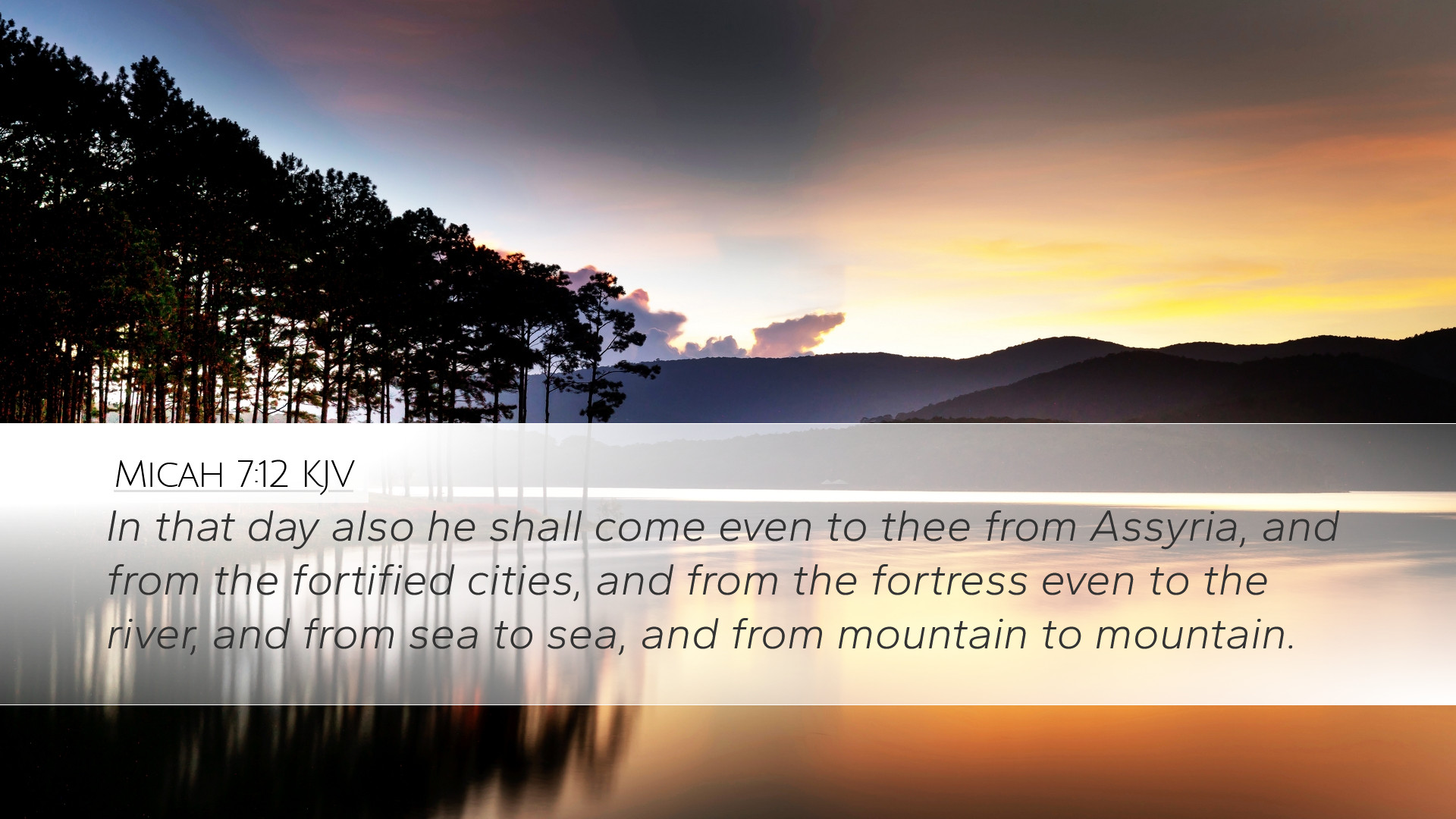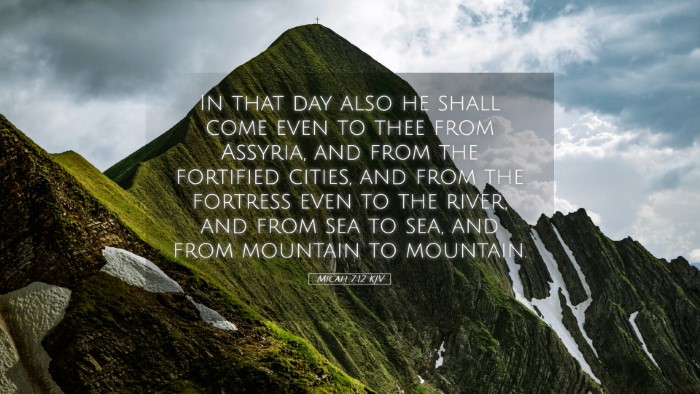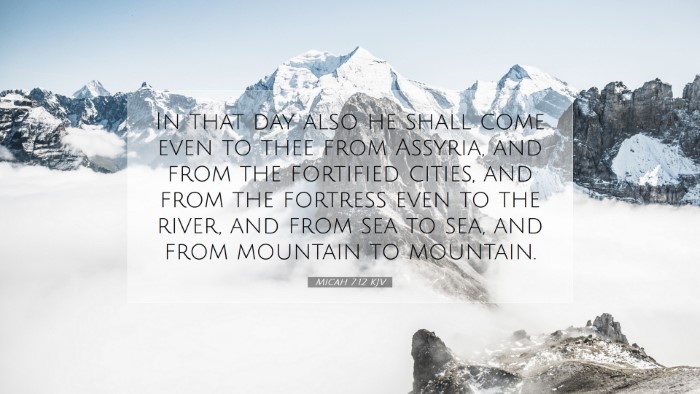Old Testament
Genesis Exodus Leviticus Numbers Deuteronomy Joshua Judges Ruth 1 Samuel 2 Samuel 1 Kings 2 Kings 1 Chronicles 2 Chronicles Ezra Nehemiah Esther Job Psalms Proverbs Ecclesiastes Song of Solomon Isaiah Jeremiah Lamentations Ezekiel Daniel Hosea Joel Amos Obadiah Jonah Micah Nahum Habakkuk Zephaniah Haggai Zechariah MalachiMicah 7:12
Micah 7:12 KJV
In that day also he shall come even to thee from Assyria, and from the fortified cities, and from the fortress even to the river, and from sea to sea, and from mountain to mountain.
Micah 7:12 Bible Commentary
Commentary on Micah 7:12
Verse Reference: Micah 7:12 - "In that day, they will come to you from Assyria and the cities of Egypt, even from Egypt to the River, and from sea to sea, and from mountain to mountain."
Introduction
This verse from Micah captures a prophetic vision of restoration and gathering. In the wider context of the book, Micah prophesies to Israel during a time of turmoil, corruption, and judgment, yet offers hope for a future salvation. The imagery used in this verse depicts a time when people from distant lands will come to seek the Lord, ushering in a period of peace and divine favor.
Theological Insights
Several key themes emerge from Micah 7:12 that resonate with the broader narrative of Scripture:
- God’s Faithfulness: Despite Israel's failures, God remains faithful to His promises. This theme is prevalent in the writings of Matthew Henry, who emphasizes God’s unyielding commitment to restore His people.
- Universal Appeal of the Gospel: The passage hints at the universal reach of God’s grace, extending invitation beyond the boundaries of Israel. This aligns with Albert Barnes’ commentary which illustrates the inclusivity of salvation to all nations.
- Hope and Restoration: The imagery of coming from diverse regions portrays the anticipated restoration not just of Israel, but of a global community seeking God. Adam Clarke elaborates on the idea of restoration stemming from God’s lovingkindness towards His people.
Contextual Analysis
Micah lived during a tumultuous period marked by moral decay, idolatry, and impending judgment. The timing of this prophecy is significant as it offers profound hope amid despair. Micah 7:12 provides a stark contrast to the preceding chapters, which highlight destruction and judgment.
The Setting of Micah
Micah prophesied in a time when both Israel and Judah faced military threats and internal corruption. Assyria was a looming threat, and the prophetic voice of Micah aimed to challenge social injustice and call the people back to faithfulness. Commentators like Barnes note that this prophecy serves as a bridge from judgment to hope, portraying a future that transcends current circumstances.
The Day of Restoration
The phrase "in that day" signals a significant eschatological moment. This expression indicates a time when divine intervention will alter the status quo. It resonates with the overarching biblical narrative, reflecting the kingdom of God where peace, justice, and community are restored.
Detailed Examination of Key Phrases
"They will come to you from Assyria"
Micah's mention of Assyria, a dominant empire at the time, signifies not only the geographical reality but also symbolizes oppression and exile. As noted by Clarke, this coming is not solely physical; it also represents a spiritual awakening and return to the true God.
"And the cities of Egypt"
Egypt represents a historical context of slavery and oppression. The inclusion of Egypt parallel to Assyria emphasizes the sweeping nature of God’s salvific plan, transcending former oppressors as a testament to divine grace. Henry posits that this offers assurance to the faithful that God will reclaim what has been lost through oppression.
"From sea to sea, and from mountain to mountain"
This phrase paints a picture of a broad and diverse gathering of people. The imagery of "sea to sea" and "mountain to mountain" indicates a comprehensive restoration that encompasses the entirety of the earth. It highlights the extent of God's reach and a forthcoming unity among His people.
Implications for Today's Believers
The message of Micah 7:12 holds significant implications for contemporary believers, particularly in addressing issues of hope, community, and recovery.
- Hope in Despair: Just as Micah offered hope to a nation in distress, modern-day believers are reminded that God’s redemption extends beyond current struggles.
- Inclusivity of God’s Kingdom: The prophetic vision invites all nations into fellowship with God, challenging us to break down barriers and extend grace to all.
- Engagement in Justice: Micah’s emphasis on justice calls the Church today to be active agents of justice, advocating for the marginalized and oppressed.
Conclusion
Micah 7:12 encapsulates a powerful message of hope, restoration, and divine faithfulness. As we reflect on this passage, we are reminded of God's unyielding promise to gather His people from all corners of the earth. Commentaries by Henry, Barnes, and Clarke highlight the theological depth and relevance of this verse, underscoring the eternal nature of God's promises to His creation.


